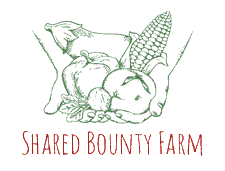High Tunnels Help People
Know Their Farmers, Know Their Food
Written By: Charlie Rahm, USDA-NRCS Field Office
 The fancy door on Jim Prouhet’s seasonal high tunnel wasn’t included in the kit he purchased with funding he received from the Natural Resources Conservation Service (NRCS). But he does credit NRCS for helping him afford the rest of the structure that allows him an earlier start to his supplemental, subscription-farming business that supplies fresh produce to St. Louis-area families.
The fancy door on Jim Prouhet’s seasonal high tunnel wasn’t included in the kit he purchased with funding he received from the Natural Resources Conservation Service (NRCS). But he does credit NRCS for helping him afford the rest of the structure that allows him an earlier start to his supplemental, subscription-farming business that supplies fresh produce to St. Louis-area families.
Prouhet operates Shared Bounty CSA (community supported agriculture) on his 20-acre farm at Troy. Now in his second year operating the CSA, Prouhet delivers produce to about 40 families who purchase shares of his crops. In exchange for assuming part of Prouhet’s farming risk, the shareholders receive about 20 weekly shipments of 17-20 pounds of locally grown produce.
“The high tunnel will help me fill out coolers earlier in the season,” Prouhet says. For example, he says that last year his first delivery of tomatoes was July 8, but this year he expects to be able to deliver them around June 1. The tomatoes will join vegetables such as cucumbers, peppers and eggplant later in the summer. The coolers delivered to shareholders’ doors now contain earlier crops such as carrots, salad greens, turnips, mixed lettuce and spinach. He also anticipates being able to provide some carrots and greens in the winter with the high tunnel on site.
Prouhet’s high tunnel is 30-by-96 feet. The kit cost about $6,000, of which NRCS paid $4,879 through its Environmental Quality Incentives Program (EQIP) at the beginning-farmer rate.
“I paid extra so that I could have a larger size,” he says. Because Prouhet also has a construction and remodeling business, he was able to add a few other amenities to his high tunnel, such as the fancy door and larger windows.
Mark Palm, NRCS resource conservationist in Lincoln County, says Prouhet is typical of a new type of customer NRCS is able to serve with the addition of high tunnels to its list of EQIP-eligible practices.
“He’s not like the traditional farmers we have mostly worked with in the past,” Palm says. “High tunnels have brought in more non-traditional customers than any program we’ve had, by far.”
Prouhet says the NRCS assistance allowed him to construct a larger high tunnel than he would have constructed without the assistance. He says he appreciates the larger high tunnel, which allows him to bring his tractor inside it to work the ground.
It’s not big enough to grow the quantity of food needed to fill the 100 CSA coolers that Prouhet says would be necessary to support a family, but he says it’s large enough to help supplement his construction business and provide a common interest for his family. His son Christopher prepares an electronic newsletter each week to let customers know what vegetables to expect that week. The newsletter includes recipes featuring those vegetables. Prouhet also maintains a website (sharedbounty.com) and has been posting short videos of his operation on YouTube because his CSA customers “like to see what’s going on out here.”
Prouhet says his customers also appreciate knowing where their food comes from and in knowing that it doesn’t contain chemicals. Prouhet says his operation is not certified organic, but he does not use chemicals.
NRCS State Conservationist J.R. Flores says Prouhet’s use of a high tunnel in his operation is indicative of what Agriculture Secretary Mike Vilsack envisioned with USDA’s Know Your Farmer, Know Your Food campaign. Know Your Farmer, Know Your Food is a USDA-wide effort to carry out President Obama’s commitment to strengthening local and regional food systems and to strengthen the connection between farmers and consumers.
“High tunnels are well suited for people in close proximity to cities who don’t have access to large acreages to grow agricultural products,” Flores says. “They help small-scale farmers produce the healthy, locally grown crops that an increasing number of people desire. A secondary benefit is that more people are gaining a better understanding of where their food comes from.”
Prouhet credits NRCS for providing the financial assistance, and also for keeping the process simple. “The process was very easy,” he says. “There were several trips to the NRCS office to sign papers, but that’s about it. Mark (Palm) even brought the contract out to the farm for me to sign.
Prouhet says high tunnels are not difficult to install, so people need not be in the construction business to have one. But if they want a fancy door on theirs, it doesn’t hurt.

